Corporate Social Responsibility Essay: Milton Friedman's View
VerifiedAdded on 2020/06/05
|12
|3622
|55
Essay
AI Summary
This essay delves into the concept of Corporate Social Responsibility (CSR), presenting a comprehensive analysis of its various aspects. The essay begins with an introduction defining CSR and its importance, followed by a main body that explores the arguments of Milton Friedman, who viewed CSR as a threat to maximizing shareholder value. The essay then contrasts Friedman's perspective with alternative theories such as public interest theory and public choice theory, examining their implications for accounting information and government legislation. The author personally disagrees with Friedman's view and argues for the importance of social responsibility, highlighting the benefits of ethical practices and stakeholder engagement. The essay also discusses Herzberg's Motivator-Hygiene theory in relation to shareholders and the impact of unethical practices. The conclusion summarizes the key arguments and provides a balanced view of the complexities of CSR.
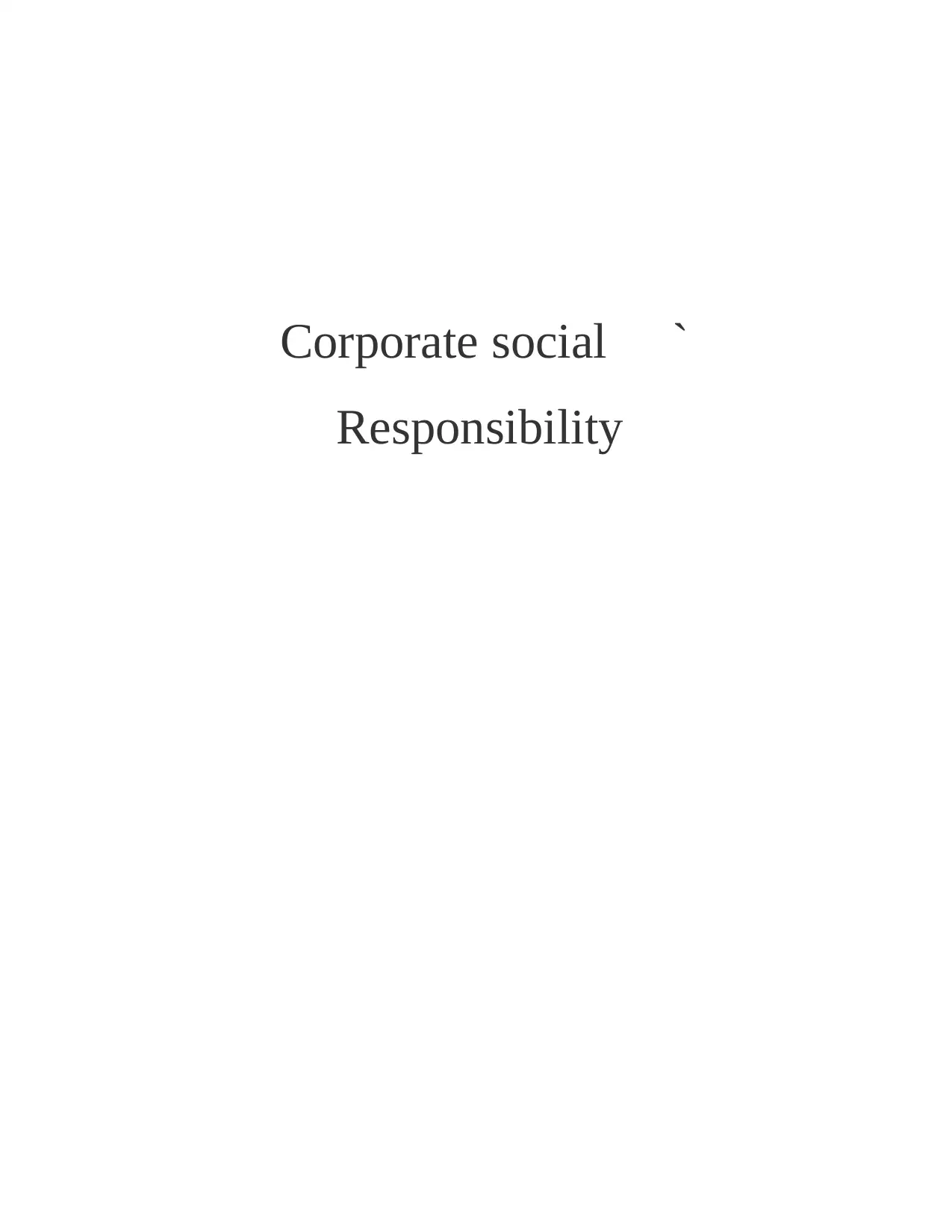
Corporate social `
Responsibility
Responsibility
Paraphrase This Document
Need a fresh take? Get an instant paraphrase of this document with our AI Paraphraser

Table of Contents
INTRODUCTION...........................................................................................................................1
Main Body.......................................................................................................................................1
Alternative theories.....................................................................................................................5
Impact of Accounting theory on accounting information...........................................................6
Government legislation and the way they effect the organisation..............................................6
CONCLUSION................................................................................................................................7
REFERENCES................................................................................................................................8
INTRODUCTION...........................................................................................................................1
Main Body.......................................................................................................................................1
Alternative theories.....................................................................................................................5
Impact of Accounting theory on accounting information...........................................................6
Government legislation and the way they effect the organisation..............................................6
CONCLUSION................................................................................................................................7
REFERENCES................................................................................................................................8
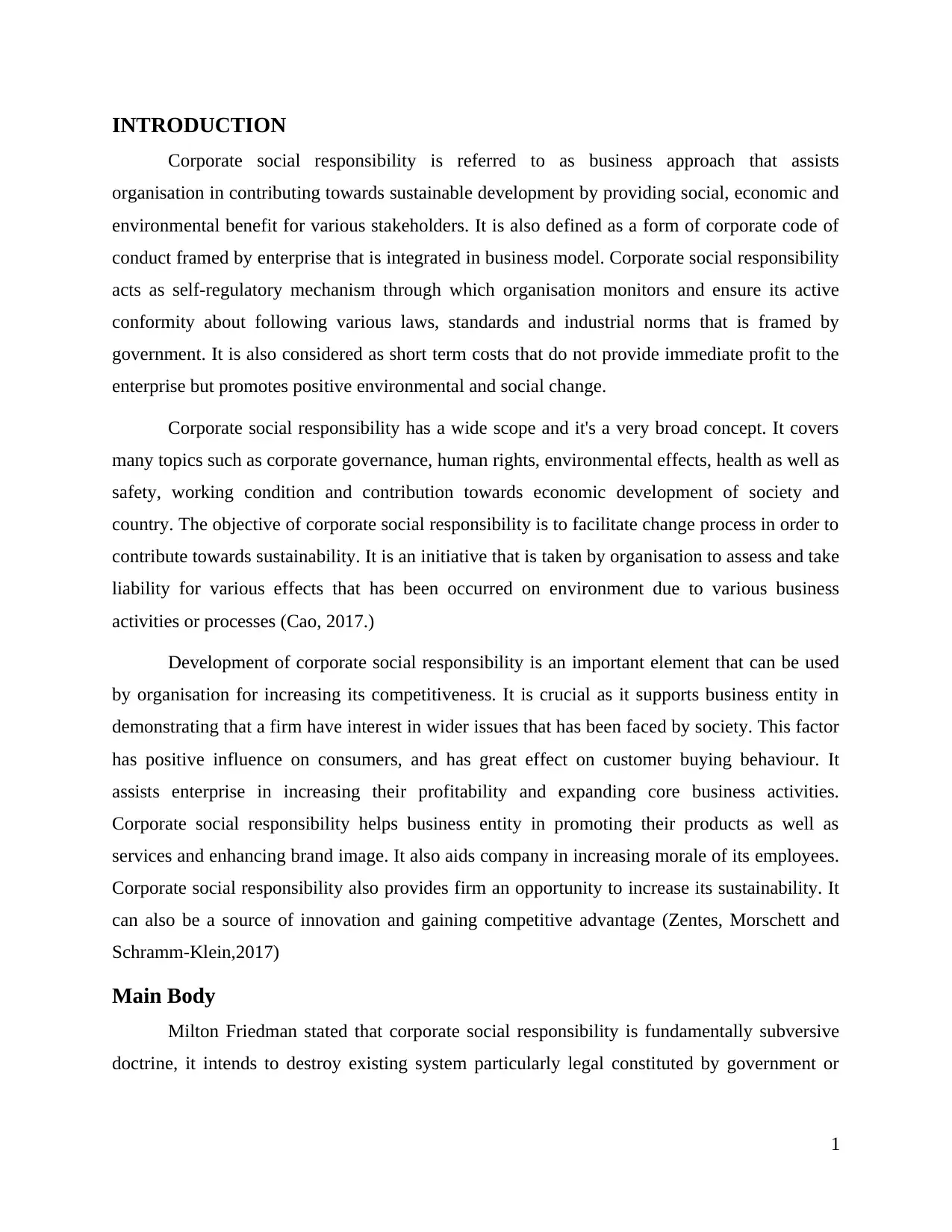
INTRODUCTION
Corporate social responsibility is referred to as business approach that assists
organisation in contributing towards sustainable development by providing social, economic and
environmental benefit for various stakeholders. It is also defined as a form of corporate code of
conduct framed by enterprise that is integrated in business model. Corporate social responsibility
acts as self-regulatory mechanism through which organisation monitors and ensure its active
conformity about following various laws, standards and industrial norms that is framed by
government. It is also considered as short term costs that do not provide immediate profit to the
enterprise but promotes positive environmental and social change.
Corporate social responsibility has a wide scope and it's a very broad concept. It covers
many topics such as corporate governance, human rights, environmental effects, health as well as
safety, working condition and contribution towards economic development of society and
country. The objective of corporate social responsibility is to facilitate change process in order to
contribute towards sustainability. It is an initiative that is taken by organisation to assess and take
liability for various effects that has been occurred on environment due to various business
activities or processes (Cao, 2017.)
Development of corporate social responsibility is an important element that can be used
by organisation for increasing its competitiveness. It is crucial as it supports business entity in
demonstrating that a firm have interest in wider issues that has been faced by society. This factor
has positive influence on consumers, and has great effect on customer buying behaviour. It
assists enterprise in increasing their profitability and expanding core business activities.
Corporate social responsibility helps business entity in promoting their products as well as
services and enhancing brand image. It also aids company in increasing morale of its employees.
Corporate social responsibility also provides firm an opportunity to increase its sustainability. It
can also be a source of innovation and gaining competitive advantage (Zentes, Morschett and
Schramm-Klein,2017)
Main Body
Milton Friedman stated that corporate social responsibility is fundamentally subversive
doctrine, it intends to destroy existing system particularly legal constituted by government or
1
Corporate social responsibility is referred to as business approach that assists
organisation in contributing towards sustainable development by providing social, economic and
environmental benefit for various stakeholders. It is also defined as a form of corporate code of
conduct framed by enterprise that is integrated in business model. Corporate social responsibility
acts as self-regulatory mechanism through which organisation monitors and ensure its active
conformity about following various laws, standards and industrial norms that is framed by
government. It is also considered as short term costs that do not provide immediate profit to the
enterprise but promotes positive environmental and social change.
Corporate social responsibility has a wide scope and it's a very broad concept. It covers
many topics such as corporate governance, human rights, environmental effects, health as well as
safety, working condition and contribution towards economic development of society and
country. The objective of corporate social responsibility is to facilitate change process in order to
contribute towards sustainability. It is an initiative that is taken by organisation to assess and take
liability for various effects that has been occurred on environment due to various business
activities or processes (Cao, 2017.)
Development of corporate social responsibility is an important element that can be used
by organisation for increasing its competitiveness. It is crucial as it supports business entity in
demonstrating that a firm have interest in wider issues that has been faced by society. This factor
has positive influence on consumers, and has great effect on customer buying behaviour. It
assists enterprise in increasing their profitability and expanding core business activities.
Corporate social responsibility helps business entity in promoting their products as well as
services and enhancing brand image. It also aids company in increasing morale of its employees.
Corporate social responsibility also provides firm an opportunity to increase its sustainability. It
can also be a source of innovation and gaining competitive advantage (Zentes, Morschett and
Schramm-Klein,2017)
Main Body
Milton Friedman stated that corporate social responsibility is fundamentally subversive
doctrine, it intends to destroy existing system particularly legal constituted by government or
1
⊘ This is a preview!⊘
Do you want full access?
Subscribe today to unlock all pages.

Trusted by 1+ million students worldwide
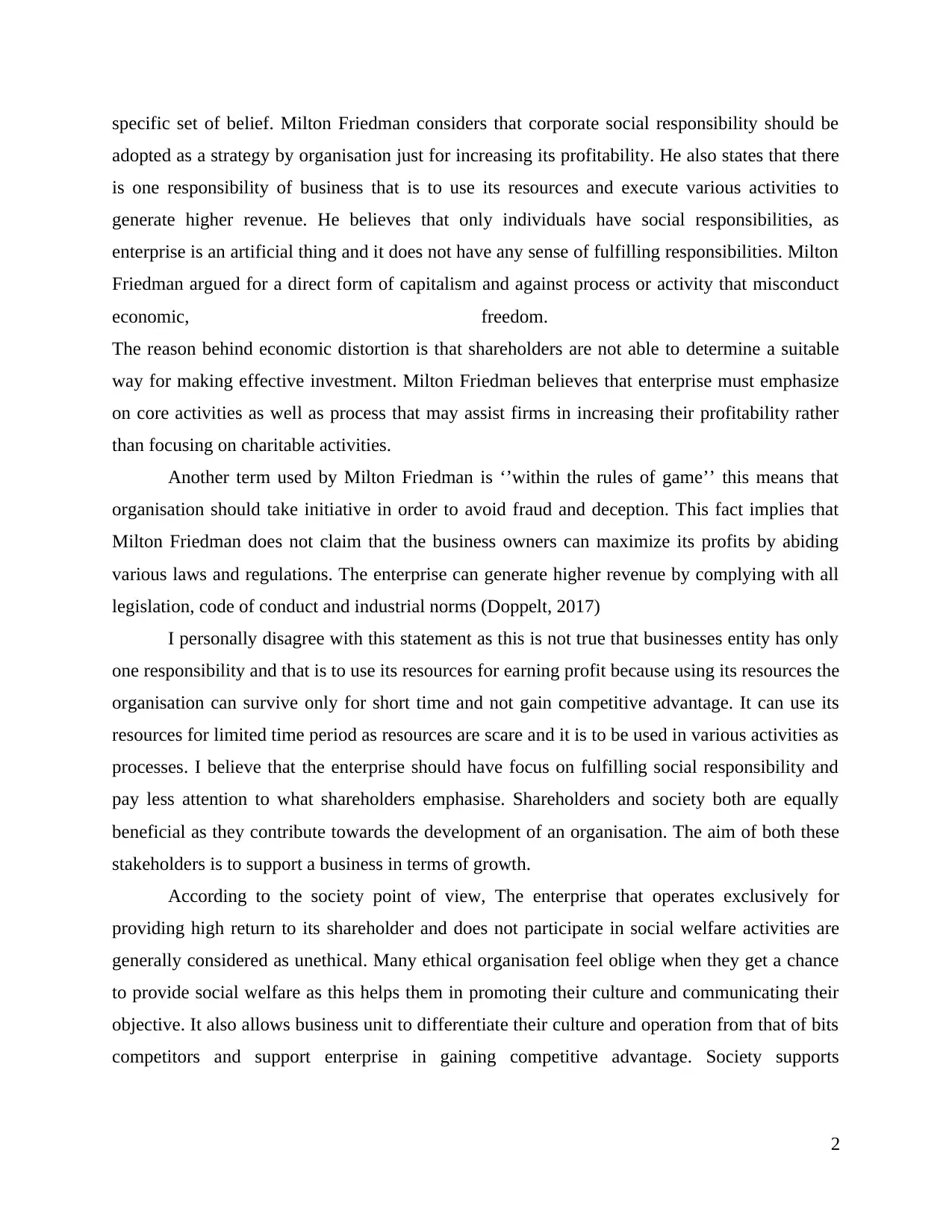
specific set of belief. Milton Friedman considers that corporate social responsibility should be
adopted as a strategy by organisation just for increasing its profitability. He also states that there
is one responsibility of business that is to use its resources and execute various activities to
generate higher revenue. He believes that only individuals have social responsibilities, as
enterprise is an artificial thing and it does not have any sense of fulfilling responsibilities. Milton
Friedman argued for a direct form of capitalism and against process or activity that misconduct
economic, freedom.
The reason behind economic distortion is that shareholders are not able to determine a suitable
way for making effective investment. Milton Friedman believes that enterprise must emphasize
on core activities as well as process that may assist firms in increasing their profitability rather
than focusing on charitable activities.
Another term used by Milton Friedman is ‘’within the rules of game’’ this means that
organisation should take initiative in order to avoid fraud and deception. This fact implies that
Milton Friedman does not claim that the business owners can maximize its profits by abiding
various laws and regulations. The enterprise can generate higher revenue by complying with all
legislation, code of conduct and industrial norms (Doppelt, 2017)
I personally disagree with this statement as this is not true that businesses entity has only
one responsibility and that is to use its resources for earning profit because using its resources the
organisation can survive only for short time and not gain competitive advantage. It can use its
resources for limited time period as resources are scare and it is to be used in various activities as
processes. I believe that the enterprise should have focus on fulfilling social responsibility and
pay less attention to what shareholders emphasise. Shareholders and society both are equally
beneficial as they contribute towards the development of an organisation. The aim of both these
stakeholders is to support a business in terms of growth.
According to the society point of view, The enterprise that operates exclusively for
providing high return to its shareholder and does not participate in social welfare activities are
generally considered as unethical. Many ethical organisation feel oblige when they get a chance
to provide social welfare as this helps them in promoting their culture and communicating their
objective. It also allows business unit to differentiate their culture and operation from that of bits
competitors and support enterprise in gaining competitive advantage. Society supports
2
adopted as a strategy by organisation just for increasing its profitability. He also states that there
is one responsibility of business that is to use its resources and execute various activities to
generate higher revenue. He believes that only individuals have social responsibilities, as
enterprise is an artificial thing and it does not have any sense of fulfilling responsibilities. Milton
Friedman argued for a direct form of capitalism and against process or activity that misconduct
economic, freedom.
The reason behind economic distortion is that shareholders are not able to determine a suitable
way for making effective investment. Milton Friedman believes that enterprise must emphasize
on core activities as well as process that may assist firms in increasing their profitability rather
than focusing on charitable activities.
Another term used by Milton Friedman is ‘’within the rules of game’’ this means that
organisation should take initiative in order to avoid fraud and deception. This fact implies that
Milton Friedman does not claim that the business owners can maximize its profits by abiding
various laws and regulations. The enterprise can generate higher revenue by complying with all
legislation, code of conduct and industrial norms (Doppelt, 2017)
I personally disagree with this statement as this is not true that businesses entity has only
one responsibility and that is to use its resources for earning profit because using its resources the
organisation can survive only for short time and not gain competitive advantage. It can use its
resources for limited time period as resources are scare and it is to be used in various activities as
processes. I believe that the enterprise should have focus on fulfilling social responsibility and
pay less attention to what shareholders emphasise. Shareholders and society both are equally
beneficial as they contribute towards the development of an organisation. The aim of both these
stakeholders is to support a business in terms of growth.
According to the society point of view, The enterprise that operates exclusively for
providing high return to its shareholder and does not participate in social welfare activities are
generally considered as unethical. Many ethical organisation feel oblige when they get a chance
to provide social welfare as this helps them in promoting their culture and communicating their
objective. It also allows business unit to differentiate their culture and operation from that of bits
competitors and support enterprise in gaining competitive advantage. Society supports
2
Paraphrase This Document
Need a fresh take? Get an instant paraphrase of this document with our AI Paraphraser
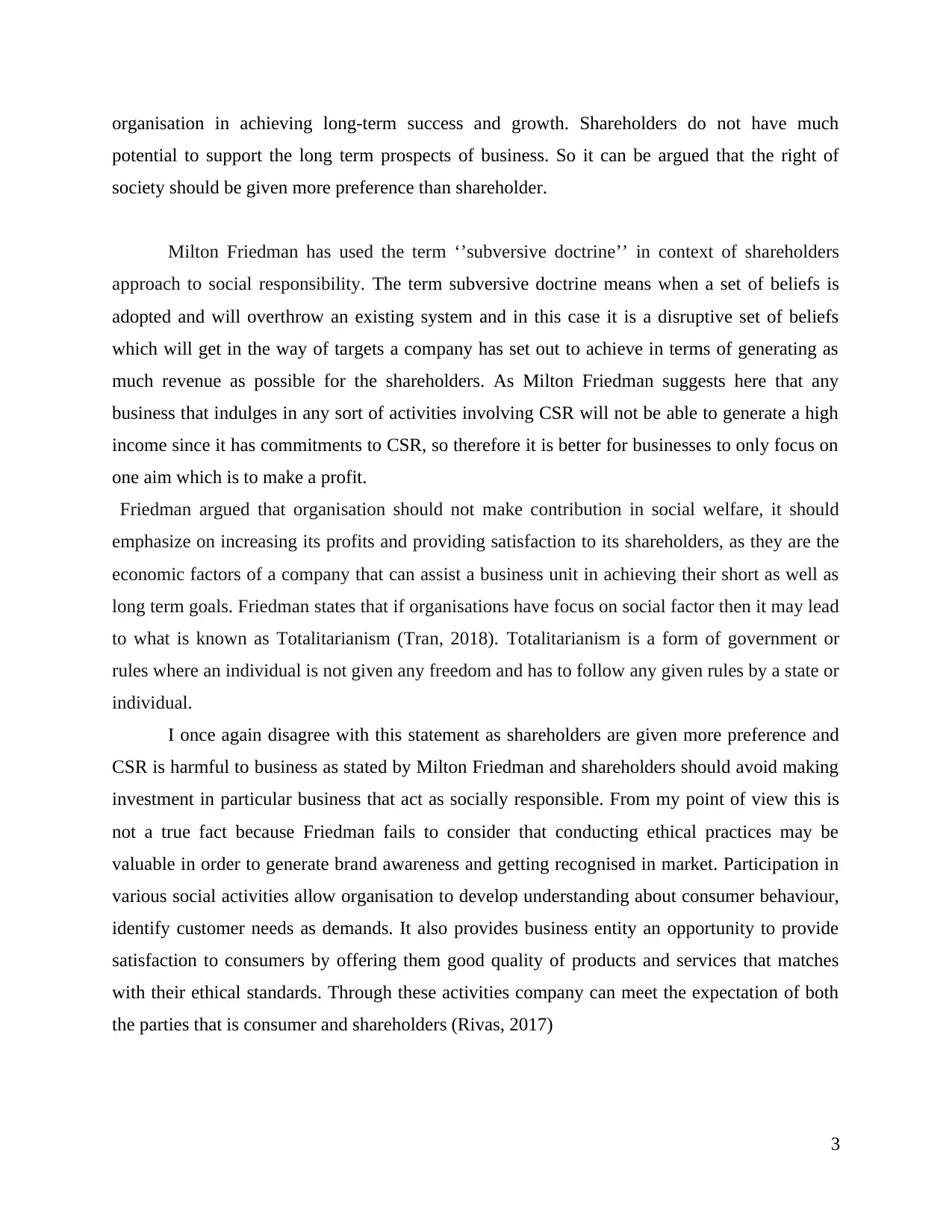
organisation in achieving long-term success and growth. Shareholders do not have much
potential to support the long term prospects of business. So it can be argued that the right of
society should be given more preference than shareholder.
Milton Friedman has used the term ‘’subversive doctrine’’ in context of shareholders
approach to social responsibility. The term subversive doctrine means when a set of beliefs is
adopted and will overthrow an existing system and in this case it is a disruptive set of beliefs
which will get in the way of targets a company has set out to achieve in terms of generating as
much revenue as possible for the shareholders. As Milton Friedman suggests here that any
business that indulges in any sort of activities involving CSR will not be able to generate a high
income since it has commitments to CSR, so therefore it is better for businesses to only focus on
one aim which is to make a profit.
Friedman argued that organisation should not make contribution in social welfare, it should
emphasize on increasing its profits and providing satisfaction to its shareholders, as they are the
economic factors of a company that can assist a business unit in achieving their short as well as
long term goals. Friedman states that if organisations have focus on social factor then it may lead
to what is known as Totalitarianism (Tran, 2018). Totalitarianism is a form of government or
rules where an individual is not given any freedom and has to follow any given rules by a state or
individual.
I once again disagree with this statement as shareholders are given more preference and
CSR is harmful to business as stated by Milton Friedman and shareholders should avoid making
investment in particular business that act as socially responsible. From my point of view this is
not a true fact because Friedman fails to consider that conducting ethical practices may be
valuable in order to generate brand awareness and getting recognised in market. Participation in
various social activities allow organisation to develop understanding about consumer behaviour,
identify customer needs as demands. It also provides business entity an opportunity to provide
satisfaction to consumers by offering them good quality of products and services that matches
with their ethical standards. Through these activities company can meet the expectation of both
the parties that is consumer and shareholders (Rivas, 2017)
3
potential to support the long term prospects of business. So it can be argued that the right of
society should be given more preference than shareholder.
Milton Friedman has used the term ‘’subversive doctrine’’ in context of shareholders
approach to social responsibility. The term subversive doctrine means when a set of beliefs is
adopted and will overthrow an existing system and in this case it is a disruptive set of beliefs
which will get in the way of targets a company has set out to achieve in terms of generating as
much revenue as possible for the shareholders. As Milton Friedman suggests here that any
business that indulges in any sort of activities involving CSR will not be able to generate a high
income since it has commitments to CSR, so therefore it is better for businesses to only focus on
one aim which is to make a profit.
Friedman argued that organisation should not make contribution in social welfare, it should
emphasize on increasing its profits and providing satisfaction to its shareholders, as they are the
economic factors of a company that can assist a business unit in achieving their short as well as
long term goals. Friedman states that if organisations have focus on social factor then it may lead
to what is known as Totalitarianism (Tran, 2018). Totalitarianism is a form of government or
rules where an individual is not given any freedom and has to follow any given rules by a state or
individual.
I once again disagree with this statement as shareholders are given more preference and
CSR is harmful to business as stated by Milton Friedman and shareholders should avoid making
investment in particular business that act as socially responsible. From my point of view this is
not a true fact because Friedman fails to consider that conducting ethical practices may be
valuable in order to generate brand awareness and getting recognised in market. Participation in
various social activities allow organisation to develop understanding about consumer behaviour,
identify customer needs as demands. It also provides business entity an opportunity to provide
satisfaction to consumers by offering them good quality of products and services that matches
with their ethical standards. Through these activities company can meet the expectation of both
the parties that is consumer and shareholders (Rivas, 2017)
3
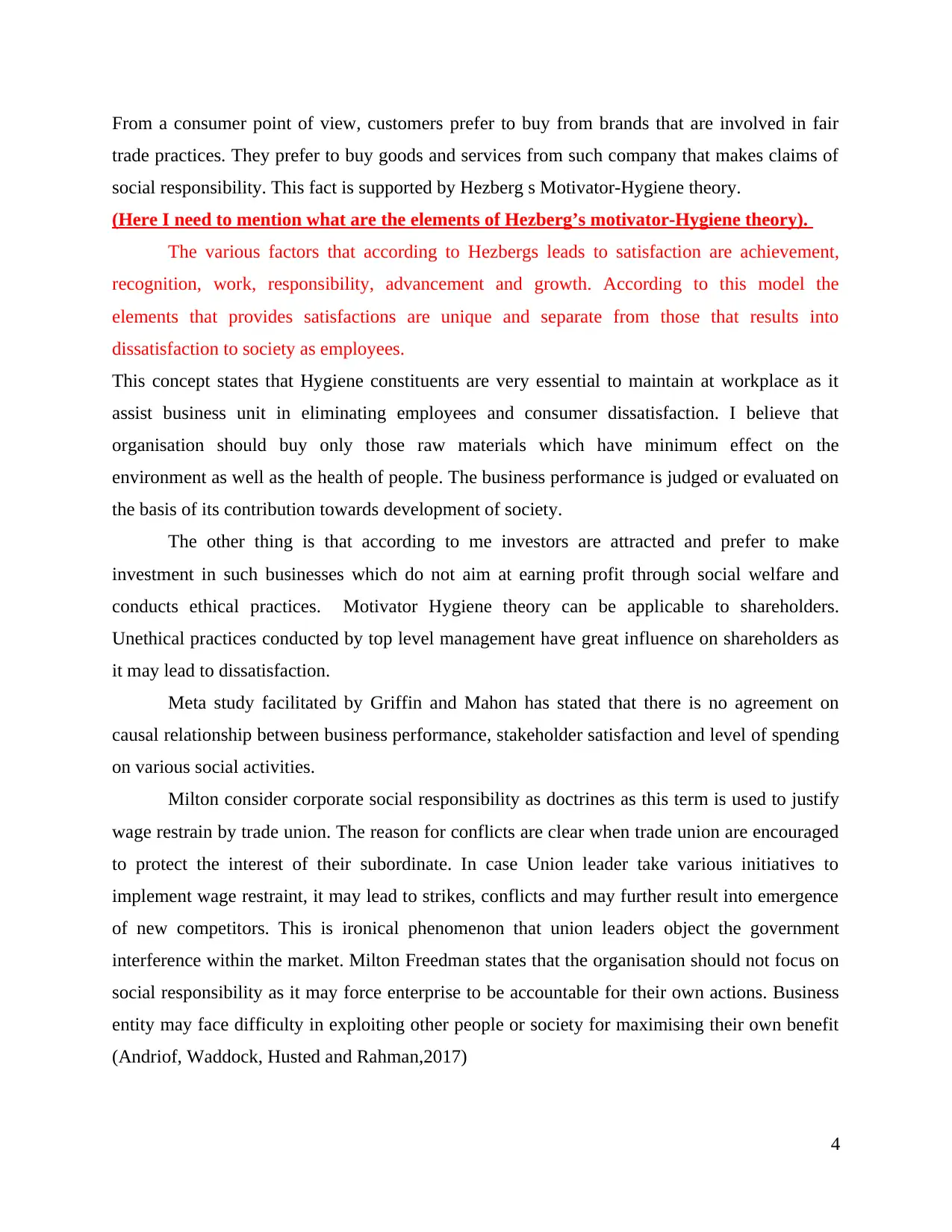
From a consumer point of view, customers prefer to buy from brands that are involved in fair
trade practices. They prefer to buy goods and services from such company that makes claims of
social responsibility. This fact is supported by Hezberg s Motivator-Hygiene theory.
(Here I need to mention what are the elements of Hezberg’s motivator-Hygiene theory).
The various factors that according to Hezbergs leads to satisfaction are achievement,
recognition, work, responsibility, advancement and growth. According to this model the
elements that provides satisfactions are unique and separate from those that results into
dissatisfaction to society as employees.
This concept states that Hygiene constituents are very essential to maintain at workplace as it
assist business unit in eliminating employees and consumer dissatisfaction. I believe that
organisation should buy only those raw materials which have minimum effect on the
environment as well as the health of people. The business performance is judged or evaluated on
the basis of its contribution towards development of society.
The other thing is that according to me investors are attracted and prefer to make
investment in such businesses which do not aim at earning profit through social welfare and
conducts ethical practices. Motivator Hygiene theory can be applicable to shareholders.
Unethical practices conducted by top level management have great influence on shareholders as
it may lead to dissatisfaction.
Meta study facilitated by Griffin and Mahon has stated that there is no agreement on
causal relationship between business performance, stakeholder satisfaction and level of spending
on various social activities.
Milton consider corporate social responsibility as doctrines as this term is used to justify
wage restrain by trade union. The reason for conflicts are clear when trade union are encouraged
to protect the interest of their subordinate. In case Union leader take various initiatives to
implement wage restraint, it may lead to strikes, conflicts and may further result into emergence
of new competitors. This is ironical phenomenon that union leaders object the government
interference within the market. Milton Freedman states that the organisation should not focus on
social responsibility as it may force enterprise to be accountable for their own actions. Business
entity may face difficulty in exploiting other people or society for maximising their own benefit
(Andriof, Waddock, Husted and Rahman,2017)
4
trade practices. They prefer to buy goods and services from such company that makes claims of
social responsibility. This fact is supported by Hezberg s Motivator-Hygiene theory.
(Here I need to mention what are the elements of Hezberg’s motivator-Hygiene theory).
The various factors that according to Hezbergs leads to satisfaction are achievement,
recognition, work, responsibility, advancement and growth. According to this model the
elements that provides satisfactions are unique and separate from those that results into
dissatisfaction to society as employees.
This concept states that Hygiene constituents are very essential to maintain at workplace as it
assist business unit in eliminating employees and consumer dissatisfaction. I believe that
organisation should buy only those raw materials which have minimum effect on the
environment as well as the health of people. The business performance is judged or evaluated on
the basis of its contribution towards development of society.
The other thing is that according to me investors are attracted and prefer to make
investment in such businesses which do not aim at earning profit through social welfare and
conducts ethical practices. Motivator Hygiene theory can be applicable to shareholders.
Unethical practices conducted by top level management have great influence on shareholders as
it may lead to dissatisfaction.
Meta study facilitated by Griffin and Mahon has stated that there is no agreement on
causal relationship between business performance, stakeholder satisfaction and level of spending
on various social activities.
Milton consider corporate social responsibility as doctrines as this term is used to justify
wage restrain by trade union. The reason for conflicts are clear when trade union are encouraged
to protect the interest of their subordinate. In case Union leader take various initiatives to
implement wage restraint, it may lead to strikes, conflicts and may further result into emergence
of new competitors. This is ironical phenomenon that union leaders object the government
interference within the market. Milton Freedman states that the organisation should not focus on
social responsibility as it may force enterprise to be accountable for their own actions. Business
entity may face difficulty in exploiting other people or society for maximising their own benefit
(Andriof, Waddock, Husted and Rahman,2017)
4
⊘ This is a preview!⊘
Do you want full access?
Subscribe today to unlock all pages.

Trusted by 1+ million students worldwide
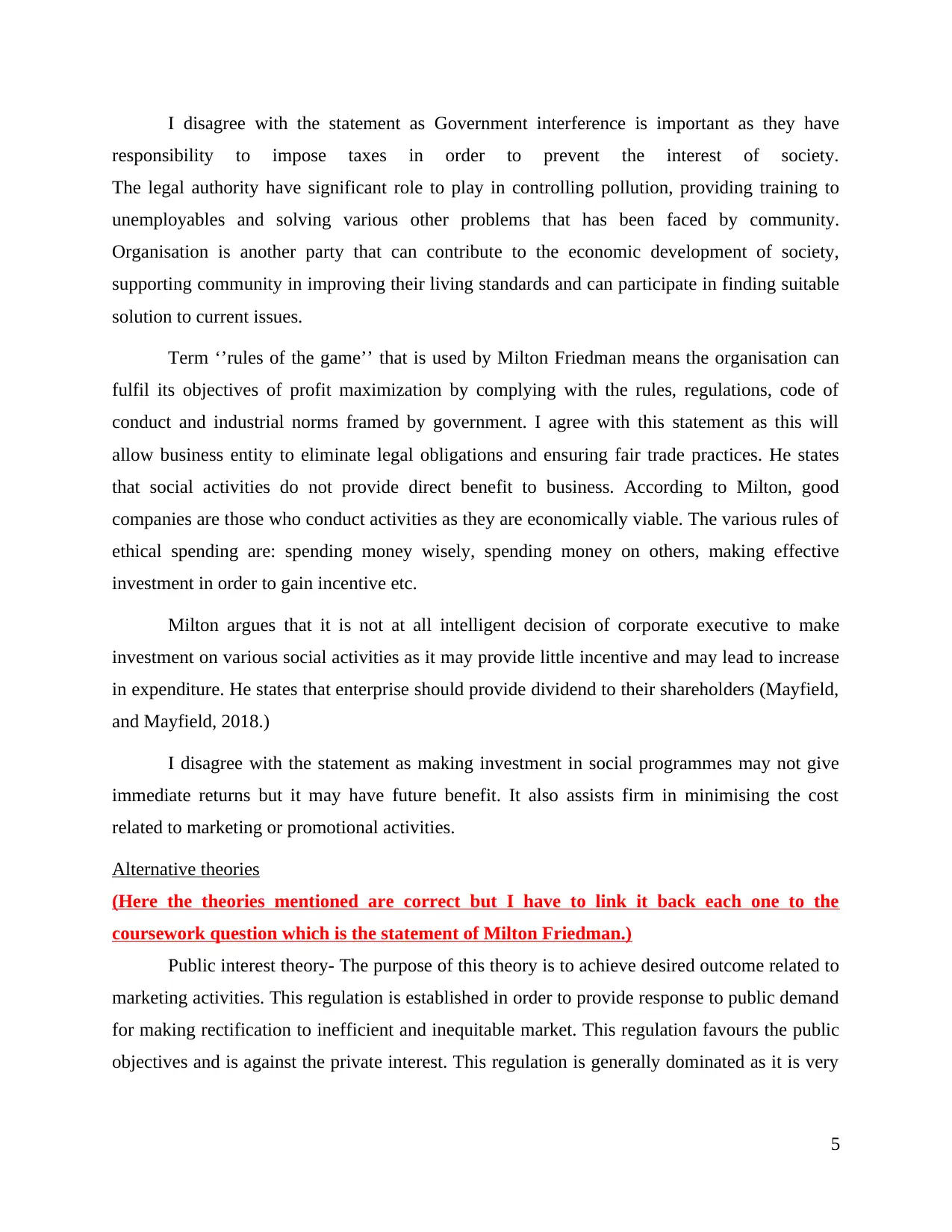
I disagree with the statement as Government interference is important as they have
responsibility to impose taxes in order to prevent the interest of society.
The legal authority have significant role to play in controlling pollution, providing training to
unemployables and solving various other problems that has been faced by community.
Organisation is another party that can contribute to the economic development of society,
supporting community in improving their living standards and can participate in finding suitable
solution to current issues.
Term ‘’rules of the game’’ that is used by Milton Friedman means the organisation can
fulfil its objectives of profit maximization by complying with the rules, regulations, code of
conduct and industrial norms framed by government. I agree with this statement as this will
allow business entity to eliminate legal obligations and ensuring fair trade practices. He states
that social activities do not provide direct benefit to business. According to Milton, good
companies are those who conduct activities as they are economically viable. The various rules of
ethical spending are: spending money wisely, spending money on others, making effective
investment in order to gain incentive etc.
Milton argues that it is not at all intelligent decision of corporate executive to make
investment on various social activities as it may provide little incentive and may lead to increase
in expenditure. He states that enterprise should provide dividend to their shareholders (Mayfield,
and Mayfield, 2018.)
I disagree with the statement as making investment in social programmes may not give
immediate returns but it may have future benefit. It also assists firm in minimising the cost
related to marketing or promotional activities.
Alternative theories
(Here the theories mentioned are correct but I have to link it back each one to the
coursework question which is the statement of Milton Friedman.)
Public interest theory- The purpose of this theory is to achieve desired outcome related to
marketing activities. This regulation is established in order to provide response to public demand
for making rectification to inefficient and inequitable market. This regulation favours the public
objectives and is against the private interest. This regulation is generally dominated as it is very
5
responsibility to impose taxes in order to prevent the interest of society.
The legal authority have significant role to play in controlling pollution, providing training to
unemployables and solving various other problems that has been faced by community.
Organisation is another party that can contribute to the economic development of society,
supporting community in improving their living standards and can participate in finding suitable
solution to current issues.
Term ‘’rules of the game’’ that is used by Milton Friedman means the organisation can
fulfil its objectives of profit maximization by complying with the rules, regulations, code of
conduct and industrial norms framed by government. I agree with this statement as this will
allow business entity to eliminate legal obligations and ensuring fair trade practices. He states
that social activities do not provide direct benefit to business. According to Milton, good
companies are those who conduct activities as they are economically viable. The various rules of
ethical spending are: spending money wisely, spending money on others, making effective
investment in order to gain incentive etc.
Milton argues that it is not at all intelligent decision of corporate executive to make
investment on various social activities as it may provide little incentive and may lead to increase
in expenditure. He states that enterprise should provide dividend to their shareholders (Mayfield,
and Mayfield, 2018.)
I disagree with the statement as making investment in social programmes may not give
immediate returns but it may have future benefit. It also assists firm in minimising the cost
related to marketing or promotional activities.
Alternative theories
(Here the theories mentioned are correct but I have to link it back each one to the
coursework question which is the statement of Milton Friedman.)
Public interest theory- The purpose of this theory is to achieve desired outcome related to
marketing activities. This regulation is established in order to provide response to public demand
for making rectification to inefficient and inequitable market. This regulation favours the public
objectives and is against the private interest. This regulation is generally dominated as it is very
5
Paraphrase This Document
Need a fresh take? Get an instant paraphrase of this document with our AI Paraphraser
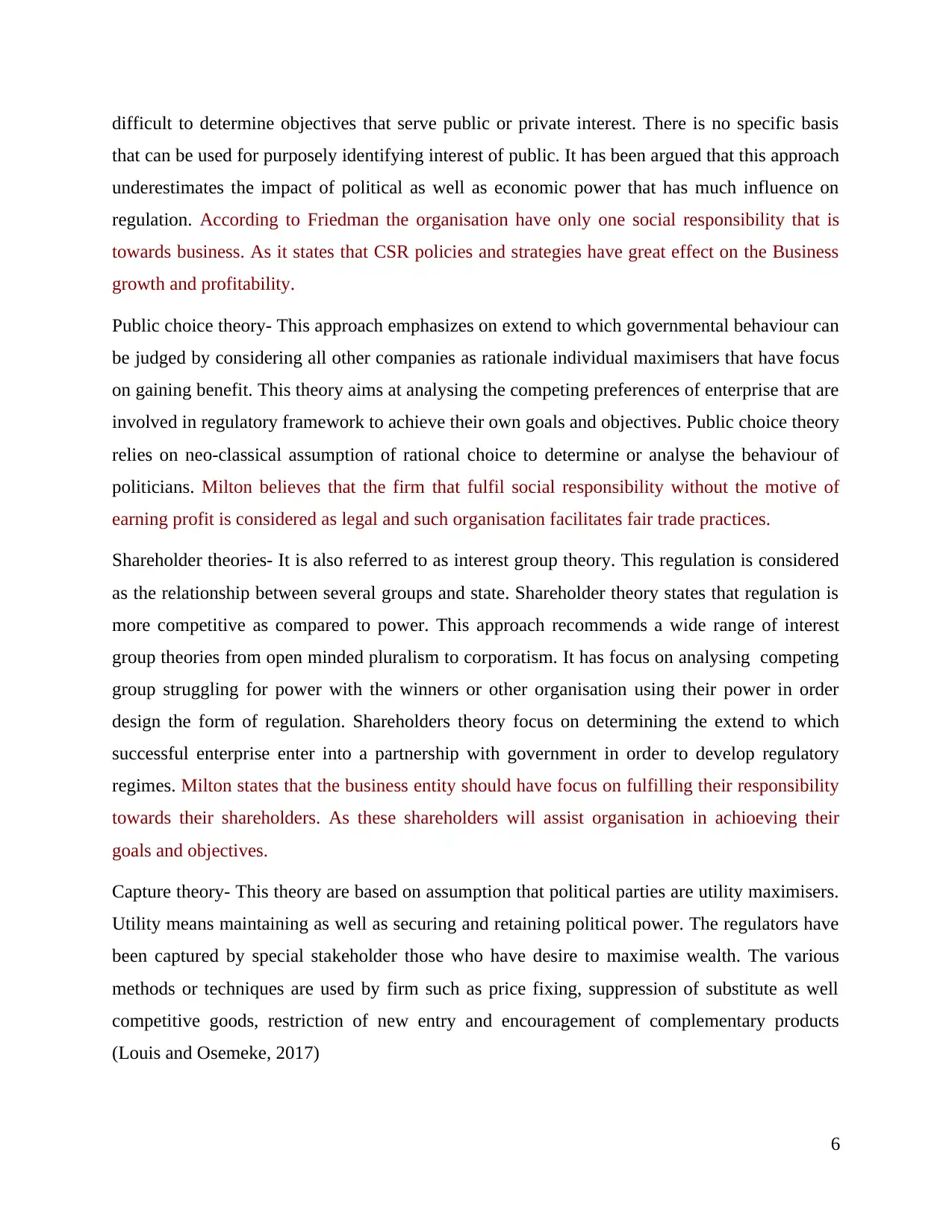
difficult to determine objectives that serve public or private interest. There is no specific basis
that can be used for purposely identifying interest of public. It has been argued that this approach
underestimates the impact of political as well as economic power that has much influence on
regulation. According to Friedman the organisation have only one social responsibility that is
towards business. As it states that CSR policies and strategies have great effect on the Business
growth and profitability.
Public choice theory- This approach emphasizes on extend to which governmental behaviour can
be judged by considering all other companies as rationale individual maximisers that have focus
on gaining benefit. This theory aims at analysing the competing preferences of enterprise that are
involved in regulatory framework to achieve their own goals and objectives. Public choice theory
relies on neo-classical assumption of rational choice to determine or analyse the behaviour of
politicians. Milton believes that the firm that fulfil social responsibility without the motive of
earning profit is considered as legal and such organisation facilitates fair trade practices.
Shareholder theories- It is also referred to as interest group theory. This regulation is considered
as the relationship between several groups and state. Shareholder theory states that regulation is
more competitive as compared to power. This approach recommends a wide range of interest
group theories from open minded pluralism to corporatism. It has focus on analysing competing
group struggling for power with the winners or other organisation using their power in order
design the form of regulation. Shareholders theory focus on determining the extend to which
successful enterprise enter into a partnership with government in order to develop regulatory
regimes. Milton states that the business entity should have focus on fulfilling their responsibility
towards their shareholders. As these shareholders will assist organisation in achioeving their
goals and objectives.
Capture theory- This theory are based on assumption that political parties are utility maximisers.
Utility means maintaining as well as securing and retaining political power. The regulators have
been captured by special stakeholder those who have desire to maximise wealth. The various
methods or techniques are used by firm such as price fixing, suppression of substitute as well
competitive goods, restriction of new entry and encouragement of complementary products
(Louis and Osemeke, 2017)
6
that can be used for purposely identifying interest of public. It has been argued that this approach
underestimates the impact of political as well as economic power that has much influence on
regulation. According to Friedman the organisation have only one social responsibility that is
towards business. As it states that CSR policies and strategies have great effect on the Business
growth and profitability.
Public choice theory- This approach emphasizes on extend to which governmental behaviour can
be judged by considering all other companies as rationale individual maximisers that have focus
on gaining benefit. This theory aims at analysing the competing preferences of enterprise that are
involved in regulatory framework to achieve their own goals and objectives. Public choice theory
relies on neo-classical assumption of rational choice to determine or analyse the behaviour of
politicians. Milton believes that the firm that fulfil social responsibility without the motive of
earning profit is considered as legal and such organisation facilitates fair trade practices.
Shareholder theories- It is also referred to as interest group theory. This regulation is considered
as the relationship between several groups and state. Shareholder theory states that regulation is
more competitive as compared to power. This approach recommends a wide range of interest
group theories from open minded pluralism to corporatism. It has focus on analysing competing
group struggling for power with the winners or other organisation using their power in order
design the form of regulation. Shareholders theory focus on determining the extend to which
successful enterprise enter into a partnership with government in order to develop regulatory
regimes. Milton states that the business entity should have focus on fulfilling their responsibility
towards their shareholders. As these shareholders will assist organisation in achioeving their
goals and objectives.
Capture theory- This theory are based on assumption that political parties are utility maximisers.
Utility means maintaining as well as securing and retaining political power. The regulators have
been captured by special stakeholder those who have desire to maximise wealth. The various
methods or techniques are used by firm such as price fixing, suppression of substitute as well
competitive goods, restriction of new entry and encouragement of complementary products
(Louis and Osemeke, 2017)
6
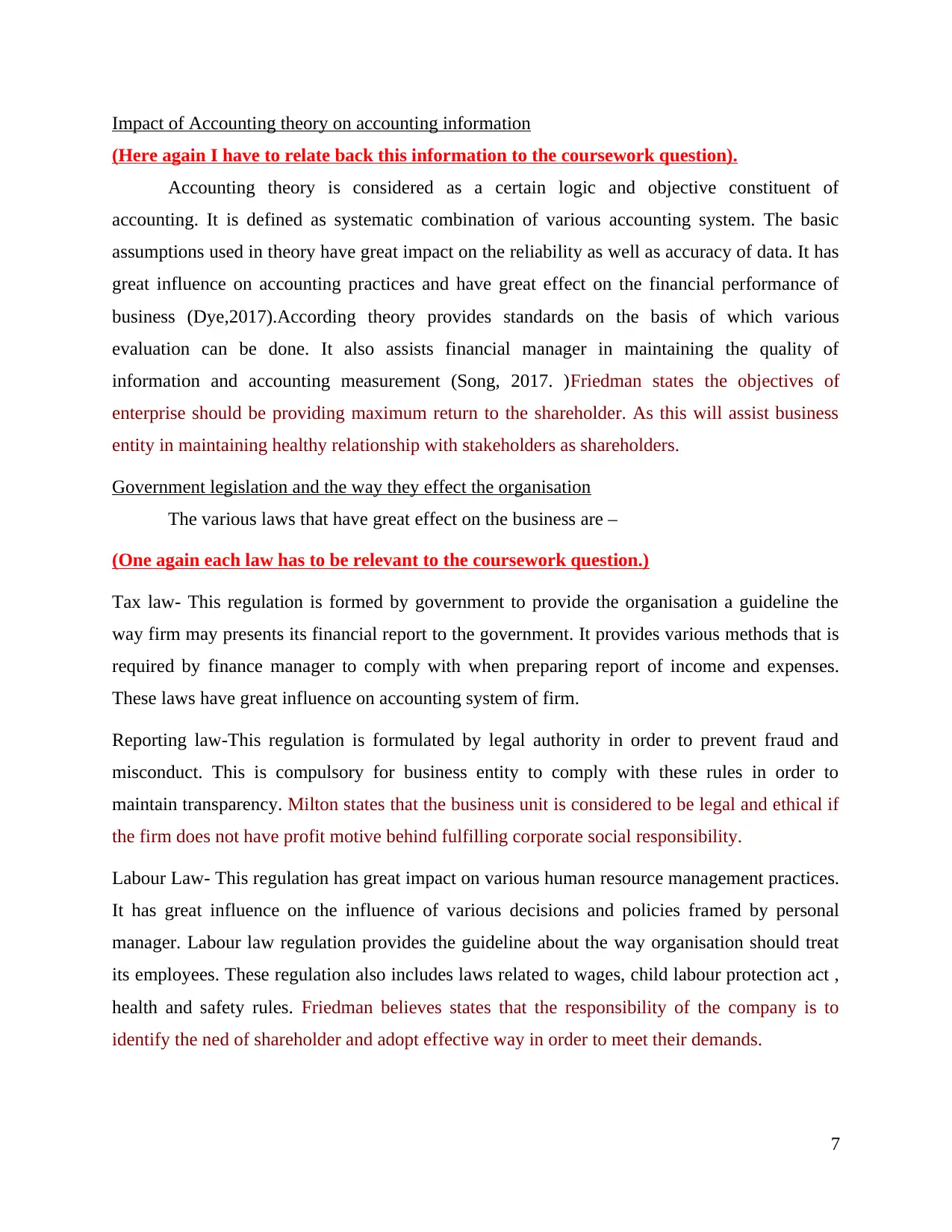
Impact of Accounting theory on accounting information
(Here again I have to relate back this information to the coursework question).
Accounting theory is considered as a certain logic and objective constituent of
accounting. It is defined as systematic combination of various accounting system. The basic
assumptions used in theory have great impact on the reliability as well as accuracy of data. It has
great influence on accounting practices and have great effect on the financial performance of
business (Dye,2017).According theory provides standards on the basis of which various
evaluation can be done. It also assists financial manager in maintaining the quality of
information and accounting measurement (Song, 2017. )Friedman states the objectives of
enterprise should be providing maximum return to the shareholder. As this will assist business
entity in maintaining healthy relationship with stakeholders as shareholders.
Government legislation and the way they effect the organisation
The various laws that have great effect on the business are –
(One again each law has to be relevant to the coursework question.)
Tax law- This regulation is formed by government to provide the organisation a guideline the
way firm may presents its financial report to the government. It provides various methods that is
required by finance manager to comply with when preparing report of income and expenses.
These laws have great influence on accounting system of firm.
Reporting law-This regulation is formulated by legal authority in order to prevent fraud and
misconduct. This is compulsory for business entity to comply with these rules in order to
maintain transparency. Milton states that the business unit is considered to be legal and ethical if
the firm does not have profit motive behind fulfilling corporate social responsibility.
Labour Law- This regulation has great impact on various human resource management practices.
It has great influence on the influence of various decisions and policies framed by personal
manager. Labour law regulation provides the guideline about the way organisation should treat
its employees. These regulation also includes laws related to wages, child labour protection act ,
health and safety rules. Friedman believes states that the responsibility of the company is to
identify the ned of shareholder and adopt effective way in order to meet their demands.
7
(Here again I have to relate back this information to the coursework question).
Accounting theory is considered as a certain logic and objective constituent of
accounting. It is defined as systematic combination of various accounting system. The basic
assumptions used in theory have great impact on the reliability as well as accuracy of data. It has
great influence on accounting practices and have great effect on the financial performance of
business (Dye,2017).According theory provides standards on the basis of which various
evaluation can be done. It also assists financial manager in maintaining the quality of
information and accounting measurement (Song, 2017. )Friedman states the objectives of
enterprise should be providing maximum return to the shareholder. As this will assist business
entity in maintaining healthy relationship with stakeholders as shareholders.
Government legislation and the way they effect the organisation
The various laws that have great effect on the business are –
(One again each law has to be relevant to the coursework question.)
Tax law- This regulation is formed by government to provide the organisation a guideline the
way firm may presents its financial report to the government. It provides various methods that is
required by finance manager to comply with when preparing report of income and expenses.
These laws have great influence on accounting system of firm.
Reporting law-This regulation is formulated by legal authority in order to prevent fraud and
misconduct. This is compulsory for business entity to comply with these rules in order to
maintain transparency. Milton states that the business unit is considered to be legal and ethical if
the firm does not have profit motive behind fulfilling corporate social responsibility.
Labour Law- This regulation has great impact on various human resource management practices.
It has great influence on the influence of various decisions and policies framed by personal
manager. Labour law regulation provides the guideline about the way organisation should treat
its employees. These regulation also includes laws related to wages, child labour protection act ,
health and safety rules. Friedman believes states that the responsibility of the company is to
identify the ned of shareholder and adopt effective way in order to meet their demands.
7
⊘ This is a preview!⊘
Do you want full access?
Subscribe today to unlock all pages.

Trusted by 1+ million students worldwide
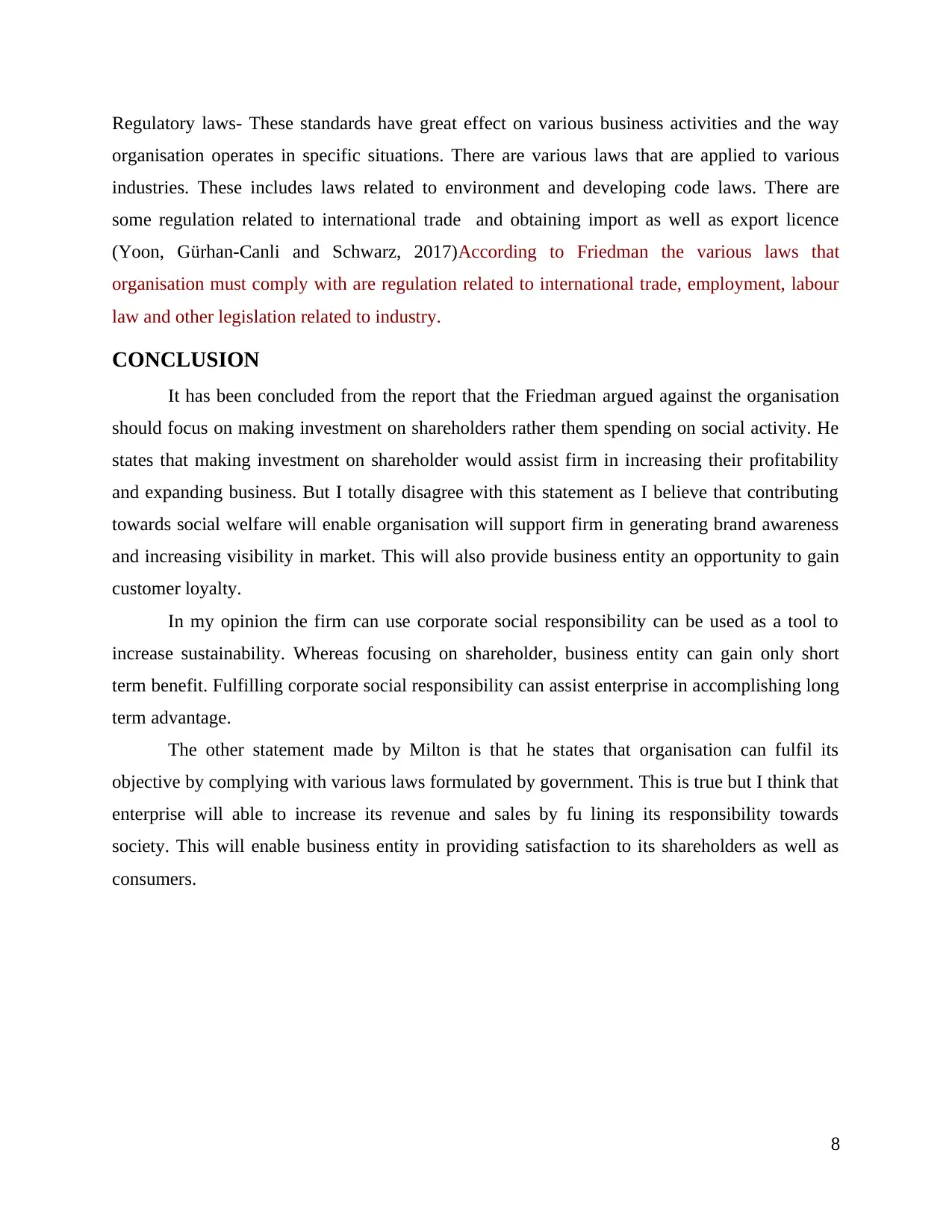
Regulatory laws- These standards have great effect on various business activities and the way
organisation operates in specific situations. There are various laws that are applied to various
industries. These includes laws related to environment and developing code laws. There are
some regulation related to international trade and obtaining import as well as export licence
(Yoon, Gürhan-Canli and Schwarz, 2017)According to Friedman the various laws that
organisation must comply with are regulation related to international trade, employment, labour
law and other legislation related to industry.
CONCLUSION
It has been concluded from the report that the Friedman argued against the organisation
should focus on making investment on shareholders rather them spending on social activity. He
states that making investment on shareholder would assist firm in increasing their profitability
and expanding business. But I totally disagree with this statement as I believe that contributing
towards social welfare will enable organisation will support firm in generating brand awareness
and increasing visibility in market. This will also provide business entity an opportunity to gain
customer loyalty.
In my opinion the firm can use corporate social responsibility can be used as a tool to
increase sustainability. Whereas focusing on shareholder, business entity can gain only short
term benefit. Fulfilling corporate social responsibility can assist enterprise in accomplishing long
term advantage.
The other statement made by Milton is that he states that organisation can fulfil its
objective by complying with various laws formulated by government. This is true but I think that
enterprise will able to increase its revenue and sales by fu lining its responsibility towards
society. This will enable business entity in providing satisfaction to its shareholders as well as
consumers.
8
organisation operates in specific situations. There are various laws that are applied to various
industries. These includes laws related to environment and developing code laws. There are
some regulation related to international trade and obtaining import as well as export licence
(Yoon, Gürhan-Canli and Schwarz, 2017)According to Friedman the various laws that
organisation must comply with are regulation related to international trade, employment, labour
law and other legislation related to industry.
CONCLUSION
It has been concluded from the report that the Friedman argued against the organisation
should focus on making investment on shareholders rather them spending on social activity. He
states that making investment on shareholder would assist firm in increasing their profitability
and expanding business. But I totally disagree with this statement as I believe that contributing
towards social welfare will enable organisation will support firm in generating brand awareness
and increasing visibility in market. This will also provide business entity an opportunity to gain
customer loyalty.
In my opinion the firm can use corporate social responsibility can be used as a tool to
increase sustainability. Whereas focusing on shareholder, business entity can gain only short
term benefit. Fulfilling corporate social responsibility can assist enterprise in accomplishing long
term advantage.
The other statement made by Milton is that he states that organisation can fulfil its
objective by complying with various laws formulated by government. This is true but I think that
enterprise will able to increase its revenue and sales by fu lining its responsibility towards
society. This will enable business entity in providing satisfaction to its shareholders as well as
consumers.
8
Paraphrase This Document
Need a fresh take? Get an instant paraphrase of this document with our AI Paraphraser
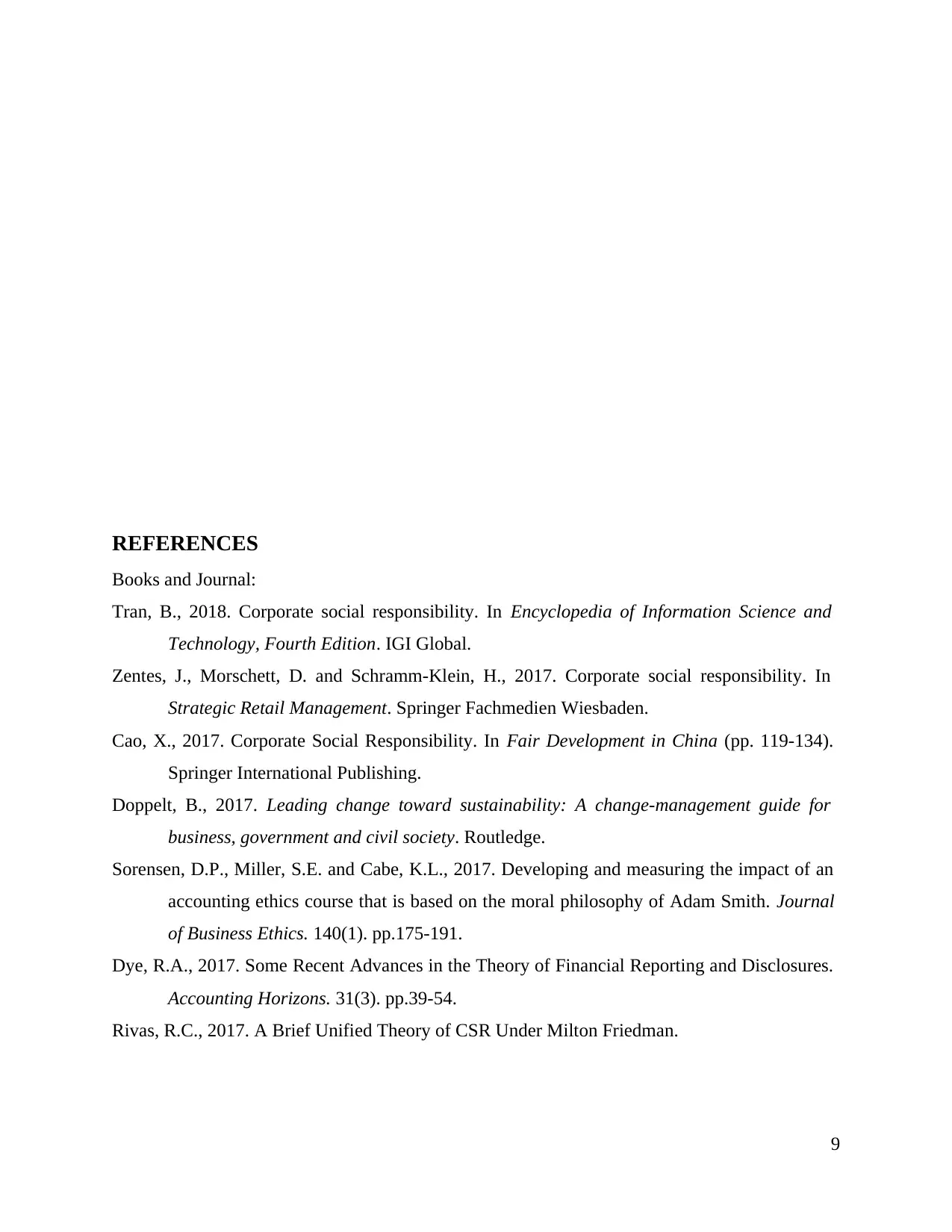
REFERENCES
Books and Journal:
Tran, B., 2018. Corporate social responsibility. In Encyclopedia of Information Science and
Technology, Fourth Edition. IGI Global.
Zentes, J., Morschett, D. and Schramm-Klein, H., 2017. Corporate social responsibility. In
Strategic Retail Management. Springer Fachmedien Wiesbaden.
Cao, X., 2017. Corporate Social Responsibility. In Fair Development in China (pp. 119-134).
Springer International Publishing.
Doppelt, B., 2017. Leading change toward sustainability: A change-management guide for
business, government and civil society. Routledge.
Sorensen, D.P., Miller, S.E. and Cabe, K.L., 2017. Developing and measuring the impact of an
accounting ethics course that is based on the moral philosophy of Adam Smith. Journal
of Business Ethics. 140(1). pp.175-191.
Dye, R.A., 2017. Some Recent Advances in the Theory of Financial Reporting and Disclosures.
Accounting Horizons. 31(3). pp.39-54.
Rivas, R.C., 2017. A Brief Unified Theory of CSR Under Milton Friedman.
9
Books and Journal:
Tran, B., 2018. Corporate social responsibility. In Encyclopedia of Information Science and
Technology, Fourth Edition. IGI Global.
Zentes, J., Morschett, D. and Schramm-Klein, H., 2017. Corporate social responsibility. In
Strategic Retail Management. Springer Fachmedien Wiesbaden.
Cao, X., 2017. Corporate Social Responsibility. In Fair Development in China (pp. 119-134).
Springer International Publishing.
Doppelt, B., 2017. Leading change toward sustainability: A change-management guide for
business, government and civil society. Routledge.
Sorensen, D.P., Miller, S.E. and Cabe, K.L., 2017. Developing and measuring the impact of an
accounting ethics course that is based on the moral philosophy of Adam Smith. Journal
of Business Ethics. 140(1). pp.175-191.
Dye, R.A., 2017. Some Recent Advances in the Theory of Financial Reporting and Disclosures.
Accounting Horizons. 31(3). pp.39-54.
Rivas, R.C., 2017. A Brief Unified Theory of CSR Under Milton Friedman.
9
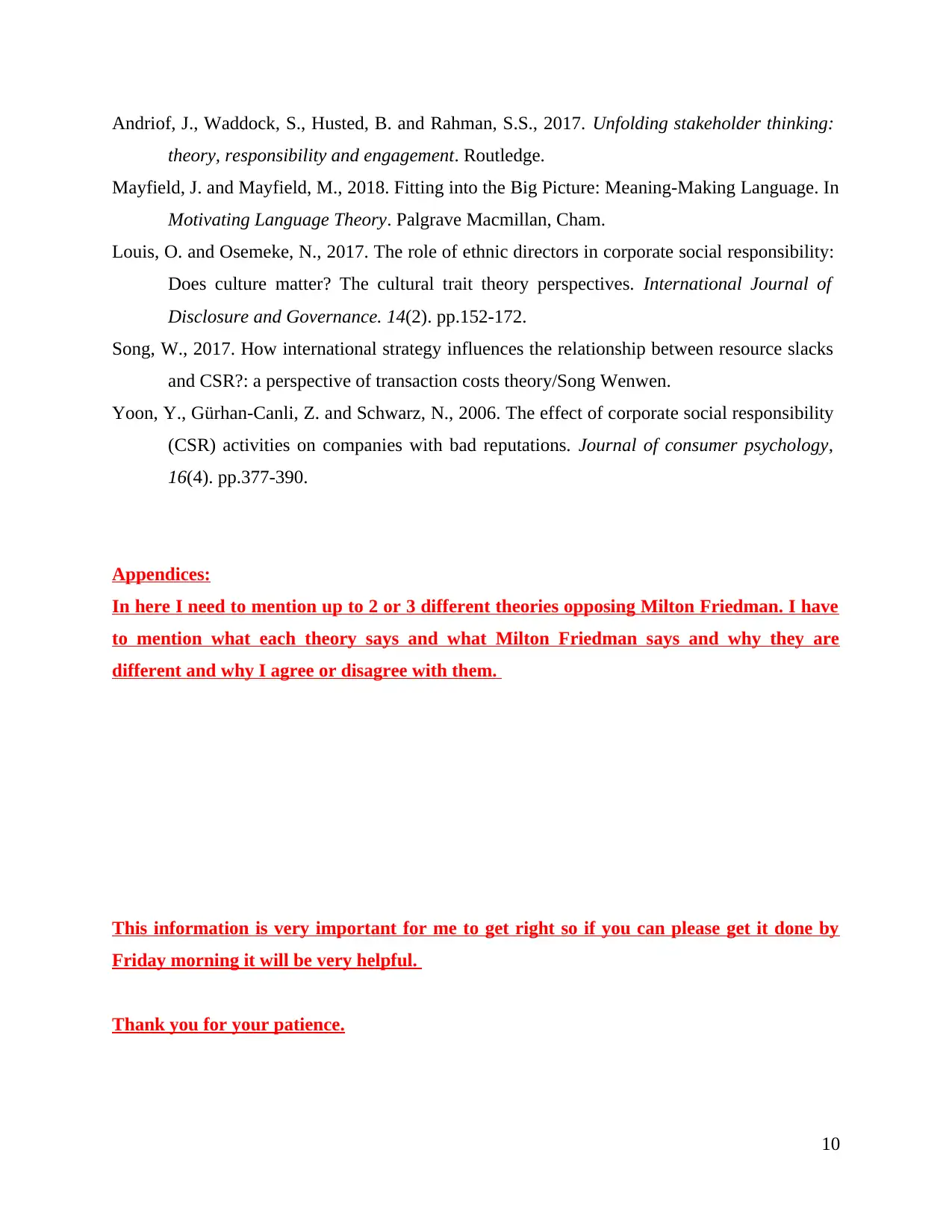
Andriof, J., Waddock, S., Husted, B. and Rahman, S.S., 2017. Unfolding stakeholder thinking:
theory, responsibility and engagement. Routledge.
Mayfield, J. and Mayfield, M., 2018. Fitting into the Big Picture: Meaning-Making Language. In
Motivating Language Theory. Palgrave Macmillan, Cham.
Louis, O. and Osemeke, N., 2017. The role of ethnic directors in corporate social responsibility:
Does culture matter? The cultural trait theory perspectives. International Journal of
Disclosure and Governance. 14(2). pp.152-172.
Song, W., 2017. How international strategy influences the relationship between resource slacks
and CSR?: a perspective of transaction costs theory/Song Wenwen.
Yoon, Y., Gürhan-Canli, Z. and Schwarz, N., 2006. The effect of corporate social responsibility
(CSR) activities on companies with bad reputations. Journal of consumer psychology,
16(4). pp.377-390.
Appendices:
In here I need to mention up to 2 or 3 different theories opposing Milton Friedman. I have
to mention what each theory says and what Milton Friedman says and why they are
different and why I agree or disagree with them.
This information is very important for me to get right so if you can please get it done by
Friday morning it will be very helpful.
Thank you for your patience.
10
theory, responsibility and engagement. Routledge.
Mayfield, J. and Mayfield, M., 2018. Fitting into the Big Picture: Meaning-Making Language. In
Motivating Language Theory. Palgrave Macmillan, Cham.
Louis, O. and Osemeke, N., 2017. The role of ethnic directors in corporate social responsibility:
Does culture matter? The cultural trait theory perspectives. International Journal of
Disclosure and Governance. 14(2). pp.152-172.
Song, W., 2017. How international strategy influences the relationship between resource slacks
and CSR?: a perspective of transaction costs theory/Song Wenwen.
Yoon, Y., Gürhan-Canli, Z. and Schwarz, N., 2006. The effect of corporate social responsibility
(CSR) activities on companies with bad reputations. Journal of consumer psychology,
16(4). pp.377-390.
Appendices:
In here I need to mention up to 2 or 3 different theories opposing Milton Friedman. I have
to mention what each theory says and what Milton Friedman says and why they are
different and why I agree or disagree with them.
This information is very important for me to get right so if you can please get it done by
Friday morning it will be very helpful.
Thank you for your patience.
10
⊘ This is a preview!⊘
Do you want full access?
Subscribe today to unlock all pages.

Trusted by 1+ million students worldwide
1 out of 12
Related Documents
Your All-in-One AI-Powered Toolkit for Academic Success.
+13062052269
info@desklib.com
Available 24*7 on WhatsApp / Email
![[object Object]](/_next/static/media/star-bottom.7253800d.svg)
Unlock your academic potential
Copyright © 2020–2026 A2Z Services. All Rights Reserved. Developed and managed by ZUCOL.





